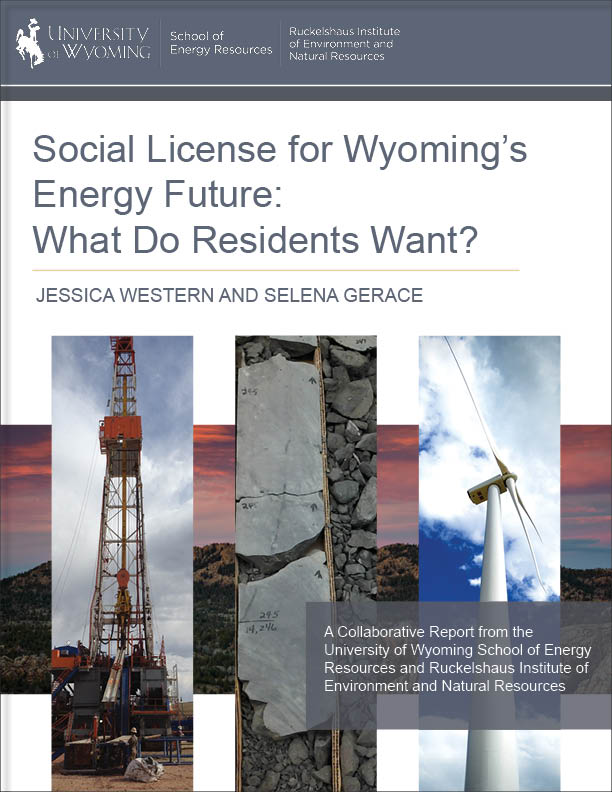UW Research Explores Wyoming Residents Acceptance for Energy Development
Published December 02, 2020
 A new study from the University of Wyoming’s School of Energy Resources (SER) and
the Ruckelshaus Institute of Environment and Natural Resources explores Wyoming residents’
perspectives of energy development, including “social license,” or the level to which
Wyoming residents support or oppose different forms and amounts of energy development.
A new study from the University of Wyoming’s School of Energy Resources (SER) and
the Ruckelshaus Institute of Environment and Natural Resources explores Wyoming residents’
perspectives of energy development, including “social license,” or the level to which
Wyoming residents support or oppose different forms and amounts of energy development.
The researchers also examined Wyomingites’ values and vision for the state’s future.
The full report, titled “Social License for Wyoming’s Energy Future: What Do Residents Want?,” is available online at www.uwyo.edu/haub/ruckelshaus-institute. SER funded the study.
The research was led by Jessica Western, a research scientist with the UW Haub School of Environment and Natural Resources, who has a background in human dimensions of natural resources and collaborative approaches to natural resource problem-solving; and Selena Gerace, an SER assistant research scientist.
The study began with a survey of more than 500 randomly selected Wyoming residents. The researchers found that Wyoming residents support natural gas (83 percent of survey respondents); oil (71 percent); solar (69 percent); wind (66 percent); and coal (63 percent) energy production.
Respondents need more information before they will support or oppose developing uranium or rare earth elements or pursuing nuclear energy, energy storage, or carbon capture and storage, according to the study.
“Wyoming is facing a tricky time as far as figuring out the state’s direction while energy markets change,” says Rob Godby, acting associate dean of the Haub School of Environment and Natural Resources. “It’s really important for state leaders and decision makers to understand what citizens want for the future, and this study provides exactly that information.”
According to the study, when respondents ranked 14 different values, Wyoming’s scenery, biological diversity and recreation opportunities were the three most important, followed by economic opportunities and sense of community.
To better understand the survey results, the researchers asked individuals involved in Wyoming’s energy industry to organize statements made by survey respondents according to level of agreement. The researchers then interviewed those individuals about their choices on how they organized the statements. This process allowed for both quantitative and qualitative analysis that revealed important findings with implications for policy and leadership decision-making.
Three themes emerged from the statistical analysis of how respondents in this second part of the study sorted the statements.
-- The first theme prioritized renewable energy; wished for the state to create a renewable energy plan; and did not see conventional energy production as economically or environmentally sustainable.
-- The next theme placed more emphasis on conventional energy development as meaningful to Wyoming’s economy and a necessary bridge to a more diverse energy economy.
-- The third theme accepted all kinds of energy development with emphasis on job training, health care availability, providing low-cost energy and reducing impacts to wildlife.
The three themes together create the Wyoming discourse regarding its energy future.
Respondents across the board agreed that Wyoming has an opportunity to advance current and new energy sources. Far from rejecting climate change, Wyoming residents feel that using it to an economic advantage -- and for many, also an environmental one -- may benefit the state. They felt Wyoming should consider energy markets outside the state, create an energy strategy and use a creative approach to its energy future.
Respondents also agreed Wyoming should develop energy resources in a way that creates jobs and safeguards displaced workers with job training and other safety nets. Additionally, respondents agreed it is important for the state to lessen impacts of all kinds of energy development -- both conventional oil and gas as well as renewable wind and solar -- on wildlife.
Results from the study indicate that Wyoming residents do grant social license for most energy development types with the clear understanding that market forces are creating change, and the state needs to quickly adapt to be economically resilient. Residents want to hold on to what they have and to create more. To create more and improve economic stability, respondents repeatedly mentioned the need for leadership, according to the study.
“As Wyoming’s energy economy continues to grow and evolve, this study helps to inform academic and research programs so that they align closely with the rationale of Wyoming residents,” says Scott Quillinan, the SER director of research and communications.
SER integrates innovative energy research and academic programs at UW and bridges academics and industry through targeted outreach programs. The Ruckelshaus Institute supports stakeholder-driven solutions to environmental challenges by conducting and communicating relevant research and promoting collaborative decision-making.
For more information, call Emilene Ostlind at (307) 314-9505 or email emilene@uwyo.edu.

